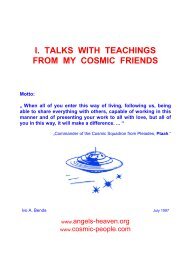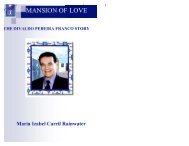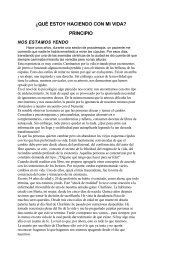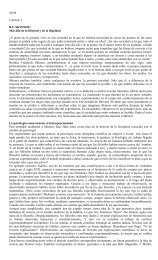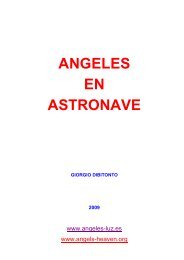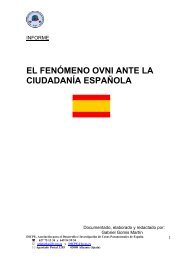The Word That is God
The Word That is God
The Word That is God
Create successful ePaper yourself
Turn your PDF publications into a flip-book with our unique Google optimized e-Paper software.
forever. All mantras come out of Om. No mantra ex<strong>is</strong>ts without Om.”<br />
<strong>The</strong> bindu of Om <strong>is</strong> the increasingly subtler sound that we experience in meditation, that<br />
ar<strong>is</strong>es eternally from the depths of <strong>God</strong> and of us.<br />
Mahar<strong>is</strong>hi Dayananda Saraswati<br />
“Om <strong>is</strong> the highest Name of <strong>God</strong>, and compr<strong>is</strong>es many other Names of <strong>God</strong>. It should be<br />
borne in mind that Om <strong>is</strong> the Name of <strong>God</strong> exclusively–and of no other object material or<br />
spiritual–while the others are but descriptive titles and not exactly proper names.” (Satyartha<br />
Prakash)<br />
Th<strong>is</strong> <strong>is</strong> an extremely important point: all “names” of <strong>God</strong> are really descriptive titles, and<br />
essentially do not designate <strong>God</strong> in a “proper” or exclusive manner as they all have meanings<br />
of their own, such as almighty, universal, and such like. Om, on the other hand, has no<br />
“meaning” at all, but <strong>is</strong> a direct name or indicator of <strong>God</strong>.<br />
Gaudapada<br />
“Having known Om, one should not think of anything whatsoever.” (Mandukya Karika 24)<br />
<strong>The</strong> idea <strong>is</strong> that nothing else should be utilized in meditation or japa but Om, for It <strong>is</strong> the<br />
source of all and the means to attain all.<br />
“One should concentrate one’s mind on Om, for Om <strong>is</strong> Brahman beyond fear. For a man,<br />
ever fixed in Brahman, there can be no fear anywhere.” (Mandukya Karika 25)<br />
“Om <strong>is</strong> surely the lower Brahman; and Om <strong>is</strong> considered to be the higher Brahman. Om <strong>is</strong><br />
without cause, and without inside and outside; and It <strong>is</strong> undecaying. Om <strong>is</strong> indeed the beginning,<br />
middle, and end–everything. Having known th<strong>is</strong> way indeed one attains immediately. One<br />
should know Om to be <strong>God</strong> seated in the hearts of all. Meditating on the all-pervasive Om, the<br />
intelligent man grieves no more. <strong>The</strong> Om, without measures and possessed of infinite dimension,<br />
<strong>is</strong> the auspicious entity where all duality ceases. He by whom Om <strong>is</strong> known, <strong>is</strong> the real sage,<br />
and not so <strong>is</strong> any other man.” (Mandukya Karika 26-29)<br />
Mahamahopadyaya Sri Gopinath Kaviraj 55<br />
“<strong>The</strong> mystic Pranava <strong>is</strong> the essence of revealed literature and of human sciences, and <strong>is</strong><br />
the creator of the world, the fount of all vidyas and mantras, and the matrix of all names and<br />
forms.” (Aspects of Indian Thought, pp. 17,18)<br />
“Jnana Shakti [the power of knowledge] <strong>is</strong> the faculty by which <strong>God</strong> as well as the liberated<br />
souls eternally enjoy the infinite joy of their beatified nature and which <strong>is</strong> indeed no other<br />
than the Shabda Brahman or Pranava.” (Aspects of Indian Thought, p. 29)<br />
In a footnote he adds: “Srikanta in the plainest language asserts the identity of Uma or the<br />
55 Sri Gopinath Kaviraj <strong>is</strong> considered to be the greatest scholar of modern India, so much so that many Indian book catalogs<br />
devoted an entire section to h<strong>is</strong> books alone. I was fortunate to know him when he lived at the end of h<strong>is</strong> life in the<br />
Anandamayi Ashram at Varanasi.<br />
67



